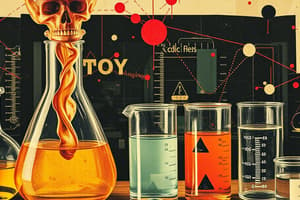Podcast
Questions and Answers
What is oxidation in a chemical change?
What is oxidation in a chemical change?
Oxidation is a chemical change where a substance loses electrons or combines with oxygen.
Describe neutralization as a chemical reaction.
Describe neutralization as a chemical reaction.
Neutralization is a chemical reaction between an acid and a base, resulting in the formation of a neutral salt and water.
What distinguishes acids from alkalis based on their chemical properties?
What distinguishes acids from alkalis based on their chemical properties?
Acids release hydrogen ions (H⁺) when dissolved in water, while alkalis release hydroxide ions (OH⁻).
What are some observable indicators of a chemical change?
What are some observable indicators of a chemical change?
Define thermal decomposition in the context of chemical changes.
Define thermal decomposition in the context of chemical changes.
Explain combustion as a chemical change.
Explain combustion as a chemical change.
What is a chemical change?
What is a chemical change?
Give an example of a chemical change involving combustion.
Give an example of a chemical change involving combustion.
Explain what happens in the process of rusting.
Explain what happens in the process of rusting.
Define pH and its significance in chemical changes.
Define pH and its significance in chemical changes.
What is the result of neutralization reaction between an acid and a base?
What is the result of neutralization reaction between an acid and a base?
Explain the concept of oxidation and its role in chemical changes.
Explain the concept of oxidation and its role in chemical changes.
Flashcards are hidden until you start studying
Study Notes
Chemical Changes: Uncovering Transformations in Matter
Understanding the world around us involves distinguishing between physical and chemical changes—two fundamental categories of matter transformations. While physical changes, such as ice melting or water boiling, do not create new substances, chemical changes, like rusting or burning food, do produce new substances with different properties.
Chemical Changes
Chemical changes occur when bonds between atoms break and form, resulting in the creation of new substances. This process is irreversible and often accompanied by a release or absorption of energy. Examples of chemical changes include:
-
Burning: When a candle burns, it produces carbon dioxide and water from the candle wax and the oxygen in the air.
-
Neutralization: When an acid (like vinegar) reacts with a base (like baking soda), a chemical change occurs, producing water and salt.
-
Combustion: When a match or a car engine burns fuel, it undergoes a chemical change, releasing energy in the form of heat and light.
-
Rusting: Iron oxidizes (rusts) when it reacts with oxygen, producing a new substance, iron oxide, with a different color and properties.
pH and Oxidation
Two important topics related to chemical changes are pH and oxidation. pH, a measure of acidity or alkalinity, changes when the proportions of hydrogen ions or hydroxide ions in a substance change. Oxidation is a chemical change where a substance loses electrons or combines with oxygen. For example, rusting is an oxidation process where iron loses electrons to oxygen, forming iron oxide.
Neutralization and Neutral Salts
Neutralization is a chemical reaction between an acid and a base, resulting in the formation of a neutral salt and water. For instance, vinegar (acetic acid) and baking soda (sodium bicarbonate) react to form sodium acetate, water, and carbon dioxide.
Acids and Alkalis
Acids and alkalis are substances with a specific chemical property. Acids release hydrogen ions (H⁺) when dissolved in water, while alkalis release hydroxide ions (OH⁻).
Evidence of Chemical Changes
Investigating chemical changes involves looking for observable evidence:
- Temperature change
- Light emitted
- Color change
- Bubbles formed
- Different smell or taste
- Precipitate formation
These indicators help us distinguish chemical changes from physical changes, in which no new substances are formed.
Studying That Suits You
Use AI to generate personalized quizzes and flashcards to suit your learning preferences.




